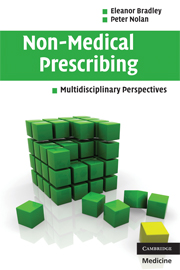Book contents
- Frontmatter
- Contents
- List of contributors
- Foreword
- Preface
- Acknowledgements
- Introduction
- 1 Medicines and prescribing – past and present
- 2 Nurse prescribing – impact, education and sustainability
- 3 Nurse prescribers: from 2003 to 2006
- 4 Nurse prescribing experienced
- 5 Nurse prescribing observed
- 6 Pharmacists and prescribing
- 7 Professions allied to medicine and prescribing
- 8 Conclusions
- Index
- References
3 - Nurse prescribers: from 2003 to 2006
Published online by Cambridge University Press: 22 August 2009
- Frontmatter
- Contents
- List of contributors
- Foreword
- Preface
- Acknowledgements
- Introduction
- 1 Medicines and prescribing – past and present
- 2 Nurse prescribing – impact, education and sustainability
- 3 Nurse prescribers: from 2003 to 2006
- 4 Nurse prescribing experienced
- 5 Nurse prescribing observed
- 6 Pharmacists and prescribing
- 7 Professions allied to medicine and prescribing
- 8 Conclusions
- Index
- References
Summary
The conditions under which policies are conceived are often very different from those in which they are implemented. Nurse prescribing has been promoted as a way of increasing access to care for service users and of streamlining and enhancing the experience of care through the provision of a complete care package delivered by one specialist practitioner. This would appear to be an improvement on a system which necessitates making multiple appointments, having investigations carried out in different locations, seeing many different people and having no clear idea of who has overall responsibility for care. Yet an early critique of the nurse prescribing initiative (McCartney et al., 1999) suggested that the drive behind nurse prescribing was not to improve the patient experience but to save money, transfer medical work to nurses and challenge the professional power of doctors. In a world where nurses spent precious time standing outside doctors' offices waiting for a prescription to be signed, the expectation was that nurses would come forward eagerly to train as prescribers.
This chapter focuses on nurses who opted to train as prescribers between 2003 and 2006. These nurses could be described as the pioneers of extended nurse prescribing, with many being the first to train in their organisations. The chapter explores whether this group shared any characteristics – such as their nursing backgrounds, personality traits or current positions – and examines their reasons for becoming prescribers, how they felt prescribing would affect their practice and how they perceived their colleagues and service users would react.
- Type
- Chapter
- Information
- Non-Medical PrescribingMultidisciplinary Perspectives, pp. 51 - 72Publisher: Cambridge University PressPrint publication year: 2008



